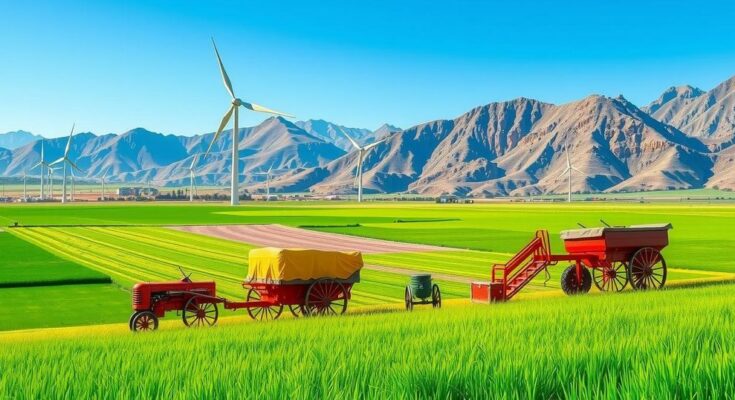A Peruvian farmer, Saul Luciano Lliuya, has initiated a landmark climate lawsuit against the German energy company RWE in Germany, seeking compensation for risks posed to his home from the overflowing Palcacocha lake. The case is notable as it may set a precedent for climate litigation globally. RWE denies responsibility, citing the global nature of climate change. The trial highlights the urgent threats of climate change to communities in the Andes.
A significant climate lawsuit commenced on Monday in a German court, initiated by a Peruvian farmer against a major German energy corporation concerning the risks posed to his home from an overflowing glacier-fed lake. Saul Luciano Lliuya, 45, resides in Huaraz, an area located in Peru’s central Ancash region, beneath Palcacocha, a high-altitude lake currently holding an alarming volume of water, which is 35 times its normal capacity. Peru, home to 70% of the world’s tropical glaciers, faces rapid glacial retreat.
The potential overflow of Palcacocha threatens not only Lliuya’s residence but also the homes of approximately 50,000 individuals in Huaraz, with catastrophic implications. Historically leveraging German property laws typically reserved for disputes with neighbors, Lliuya targets RWE, a prominent energy company identified as one of Europe’s top greenhouse gas emitters due to its coal-powered plants.
Collaborating with the local nonprofit Germanwatch, Lliuya contends that RWE has contributed 0.47% of all human-generated carbon emissions since 1898. He seeks compensation corresponding to this percentage—approximately $18,000—to assist in constructing a protective dyke for Huaraz. This case marks the first among nearly 50 similar climate lawsuits worldwide, including one filed by Honolulu against leading oil corporations.
Although the ruling may not set a precedent across jurisdictions, it serves as a significant legal framework for other countries with analogous property laws. RWE, which has no operations in Peru, refutes any legal accountability and argues that climate change is a multifaceted global dilemma. According to RWE, accountability for carbon emissions should be determined through governmental policy, not the courts.
The imminent danger posed by Palcacocha resonates deeply within the Huaraz community; a past earthquake in 1970 caused a landslide resulting in approximately 25,000 fatalities. Climate change has perpetuated a wide array of severe consequences in the Peruvian Andes, including water source depletion, toxic local streams, and changing agricultural conditions. Lliuya expressed concern over the rising lake levels, stating, “It is scary, the risk from climate change. There is a lot of fear and the lake’s levels have risen. People are very worried.”
Francesca Mascha Klein, a lawyer with Germanwatch, emphasized the importance of this case: “No one should live in fear of losing their home due to the climate crisis. Polluters have to step up and pay the true price of their business model.” The proceedings are taking place near RWE’s headquarters in Hamm, Germany, and the trial may span several weeks.
This landmark case represents a pivotal step in the ongoing struggle against climate change, illustrating the legal responsibilities of companies contributing to environmental degradation. With significant stakes for vulnerable communities like Huaraz, the outcome may inspire similar actions globally. As exemplified by Lliuya’s litigation, the intersection of corporate accountability and climate justice is increasingly being brought to the forefront, demanding that major polluters address the consequences of their business practices on local environments and communities.
Original Source: www.gpb.org




